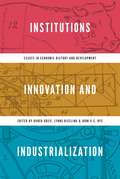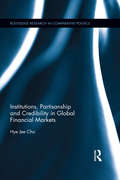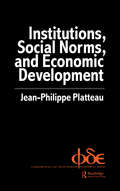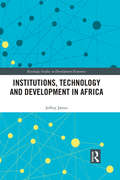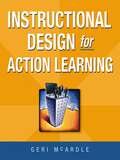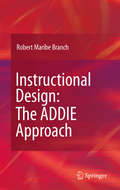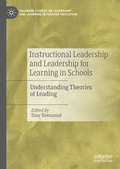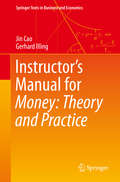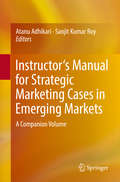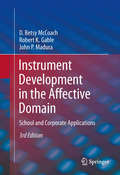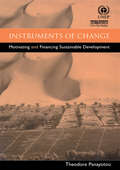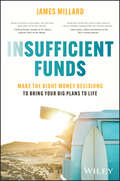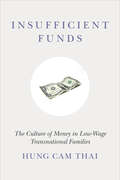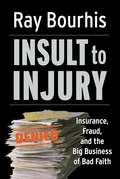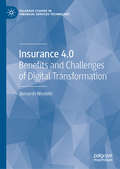- Table View
- List View
Institutions, Ideas and Learning in Welfare State Change
by Timo FleckensteinInvestigates the transformation of German labour market policy, showing that Germany has departed from the conservative-corporatist path of welfare, especially with the Hartz Legislation of the Red-Green government.
Institutions, Innovation, and Industrialization: Essays in Economic History and Development
by Avner Greif Lynne Kiesling John V.C. NyeThis book brings together a group of leading economic historians to examine how institutions, innovation, and industrialization have determined the development of nations. Presented in honor of Joel Mokyr—arguably the preeminent economic historian of his generation—these wide-ranging essays address a host of core economic questions. What are the origins of markets? How do governments shape our economic fortunes? What role has entrepreneurship played in the rise and success of capitalism? Tackling these and other issues, the book looks at coercion and exchange in the markets of twelfth-century China, sovereign debt in the age of Philip II of Spain, the regulation of child labor in nineteenth-century Europe, meat provisioning in pre–Civil War New York, aircraft manufacturing before World War I, and more. The book also features an essay that surveys Mokyr's important contributions to the field of economic history, and an essay by Mokyr himself on the origins of the Industrial Revolution.In addition to the editors, the contributors are Gergely Baics, Hoyt Bleakley, Fabio Braggion, Joyce Burnette, Louis Cain, Mauricio Drelichman, Narly Dwarkasing, Joseph Ferrie, Noel Johnson, Eric Jones, Mark Koyama, Ralf Meisenzahl, Peter Meyer, Joel Mokyr, Lyndon Moore, Cormac Ó Gráda, Rick Szostak, Carolyn Tuttle, Karine van der Beek, Hans-Joachim Voth, and Simone Wegge.
Institutions, Innovations, and Growth
by Haizhou Huang Chenggang XuA report from the International Monetary Fund.
Institutions, Institutional Change and Economic Performance
by Douglass C. NorthContinuing his groundbreaking analysis of economic structures, Douglass North develops an analytical framework for explaining the ways in which institutions and institutional change affect the performance of economies, both at a given time and over time. Institutions exist, he argues, due to the uncertainties involved in human interaction; they are the constraints devised to structure that interaction. Yet, institutions vary widely in their consequences for economic performance; some economies develop institutions that produce growth and development, while others develop institutions that produce stagnation. North first explores the nature of institutions and explains the role of transaction and production costs in their development. The second part of the book deals with institutional change. Institutions create the incentive structure in an economy, and organizations will be created to take advantage of the opportunities provided within a given institutional framework. North argues that the kinds of skills and knowledge fostered by the structure of an economy will shape the direction of change and gradually alter the institutional framework. He then explains how institutional development may lead to a path-dependent pattern of development. In the final part of the book, North explains the implications of this analysis for economic theory and economic history. He indicates how institutional analysis must be incorporated into neo-classical theory and explores the potential for the construction of a dynamic theory of long-term economic change. Douglass C. North is Director of the Center of Political Economy and Professor of Economics and History at Washington University in St. Louis. He is a past president of the Economic History Association and Western Economics Association and a Fellow, American Academy of Arts and Sciences. He has written over sixty articles for a variety of journals and is the author of The Rise of the Western World: A New Economic History (CUP, 1973, with R. P. Thomas) and Structure and Change in Economic History (Norton, 1981). Professor North is included in Great Economists Since Keynes edited by M. Blaug (CUP, 1988 paperback ed. )
Institutions, Partisanship and Credibility in Global Financial Markets (Routledge Research in Comparative Politics)
by Hye Jee ChoIncreasingly integrated global financial markets have been shaken by a series of severe shocks in recent decades, from Mexico’s Tequila crisis to the upheavals in the Eurozone. These crises have demonstrated that signs of uncertain local economic and political conditions can result in market fluctuations which in turn cause economic, social, and political instability. Such instability is particularly severe for developing countries that rely heavily on international financial markets for their financial needs. Building credibility in these markets is therefore important for national governments who wish to prevent market panic and capital flight and, ultimately, to achieve stable economic growth. Earlier studies have argued that institutional arrangements that constrain governments and commit them to protecting private property rights and market-friendly policies can send a strong positive signal to the markets about a given country’s sovereign credibility. This book argues, however, that the market perception of such credibility-building institutions is significantly contingent on which party governs the country. Formal institutions confer significant credibility-building effects on left-wing governments, whereas less or no significant effects are enjoyed by right-wing governments. And beyond that, any significant changes in a country’s institutional landscape—such as a breakdown of democracy or joining an international organization that can influence domestic politics—have particularly strong impact on the credibility of left-wing governments. This argument is supported by a quantitative analysis of sovereign credit ratings data collected from around 90 developing countries from 1980 to 2007, by case studies from South Asia, Eastern Europe and Latin America, and by face-to-face interviews with 24 financial market experts based in Hong Kong, Seoul, and Paris.
Institutions, Property Rights, and Economic Growth
by Sebastian Galiani Itai SenedThis volume showcases the impact of the work of Douglass C. North, winner of the Nobel Prize and father of the field of new institutional economics. Leading scholars contribute to a substantive discussion that best illustrates the broad reach and depth of Professor North's work. The volume speaks concisely about his legacy across multiple social sciences disciplines, specifically on scholarship pertaining to the understanding of property rights, the institutions that support the system of property rights, and economic growth.
Institutions, Regulatory Styles, Society and Environmental Governance in China
by Carlos Wing-Hung Lo Shui-Yan TangDuring the past three decades of rapid industrial growth, China has suffered from devastating environmental degradation. Most scholarly and popular publications have painted a rather pessimistic picture about the worrisome trend. Yet a somewhat more optimistic view has emerged in the past decade given the Chinese government’s increased commitment to fighting industrial pollution, the public’s increased concerns regarding the adverse effects of pollution, and domestic and international civil society’s increased involvement in promoting environmental protection in China. Drawing on the authors’ extensive research on Guangdong Province and a few large cities in other provinces, this book provides an in-depth study on China’s environmental governance and regulatory enforcement in the past two decades. Section 1 examines various institutional constraints for environmental regulation enforcement at the local level and how governance reform efforts in the past decade have contributed to the lessening of those constraints. Section 2 draws on data derived from surveys and interviews conducted in multiple cities and times; it examines the dominant regulatory enforcement styles of local environmental protection bureaus and how these styles vary across different regions and over time. Section 3 examines how various stakeholders—the general public, environmental groups, government entities, and corporations—affect the environmental governance process. Overall, the book presents a cautiously optimistic view on the evolution of environmental governance in China. While highlighting many political, institutional, social, and economic constraints, it also documents many changes that have taken place—including reform efforts from within the government administrative system, increasingly societal concerns and actions, and changing attitudes among corporate executives—potentially paving the way for more effective environmental governance in the future.
Institutions, Social Norms and Economic Development (Fundamentals Of Development Economics Ser. #Vol. 1)
by Jean-Philippe PlatteauIn order for economic specialization to develop, it is important that well-defined property rights are established and that suspicion and fear of fraud do not pervade transactions. Such conditions cannot be created ex abrubto, but must somehow evolve. What needs to develop is not only suitable practices and rules themselves, but also the public agencies and moral environment without which generalized trust is difficult to establish. The cultural endowment of societies as they have developed over their particular histories is bound to play a major role in this regard, and the matter of cultual endowment is one of the central themes of this book.On the other hand, division of labour does not only require well-enforced property rights and trust in economic dealings. It is also critically conditioned by the thickness of economic space, itself dependent on population density. This provides the second major theme of the volume: market development, including the development of private property rights is not possible, or will remain very incomplete, if populations are thinly spread over large areas of land. The book makes special reference to sub-Saharan Africa.
Institutions, Technology and Development in Africa (Routledge Studies in Development Economics)
by Jeffrey JamesAn extensive literature has demonstrated that technologies in sub-Saharan Africa are largely inappropriate: that is, that they are typically capital- and import-intensive rather than labour- and local input-intensive. These technologies have created a pattern of development that is highly unequal, with widespread unemployment and under-employment. In this literature, however, relatively little attention has been paid to the institutions that govern the generation, adoption and use of technology. This book draws on historical analysis and case studies to evaluate how institutions in different countries, including those in Africa itself, generate technologies that vary in their characteristics and suitability for the region. Through these case studies, insight is gained into the characteristics of ‘appropriate’ institutions that might underlie a more balanced pattern of technology and development than currently exists. The findings of the book clearly confirm a major tenet of institutionalist theory: namely, that institutions developed in one set of circumstances are unlikely to be appropriate to conditions in a markedly different set. This book will be of interest to economists, social historians and anyone with an interest in modern African development.
Institutions, Technology, and Circular and Cumulative Causation in Economics
by Henning SchwardtThe book investigates the relation between technology and institutions and their mutual influence during processes of development and change and illustrates this on the development process in Argentina after 1946. General and case-study specific policy recommendations are offered.
Instructional Design for Action Learning
by Geri McArdleThis book gives you all the guidance and exercises you need to incorporate action learning into every training you conduct.A trainer&’s job is to ensure their lessons stick, which means relating lessons to their trainees&’ own on-the-job experiences. Author Geri McArdle teaches trainers how to do this by using the strategies of &“action learning&” in their lesson design and presentation to help learners better absorb the material.Filled with examples of easy-to-implement action learning techniques, Instructional Design for Action Learning shows you how to: create fun and memorable activities that match participants&’ needs, learning styles, and levels of understanding;encourage learners to build on their own experiences;evaluate learner mastery during the entire learning event;strengthen learning transfer back on the job;and accurately measure post-training results.By providing trainers with the tools they need to make real learning happen, this essential guide strengthens the value of your program--and the job performance of those you train.
Instructional Design: The ADDIE Approach
by Robert Maribe BranchThe Analyze, Design, Develop, Implement, and Evaluate (ADDIE) process is used to introduce an approach to instruction design that has a proven record of success. Instructional Design: The ADDIE Approach is intended to serve as an overview of the ADDIE concept. The primary rationale for this book is to respond to the need for an instruction design primer that addresses the current proliferation of complex educational development models, particularly non-traditional approaches to learning, multimedia development and online learning environments. Many entry level instructional designers and students enrolled in related academic programs indicate they are better prepared to accomplish the challenging work of creating effective training and education materials after they have a thorough understanding of the ADDIE principles. However, a survey of instructional development applications indicate that the overwhelming majority of instructional design models are based on ADDIE, often do not present the ADDIE origins as part of their content, and are poorly applied by people unfamiliar with the ADDIE paradigm. The purpose of this book is to focus on fundamental ADDIE principles, written with a minimum of professional jargon. This is not an attempt to debate scholars or other educational professionals on the finer points of instructional design, however, the book's content is based on sound doctrine and supported by valid empirical research. The only bias toward the topic is that generic terms will be used as often as possible in order to make it easy for the reader to apply the concepts in the book to other specific situations.
Instructional Leadership and Leadership for Learning in Schools: Understanding Theories of Leading (Palgrave Studies on Leadership and Learning in Teacher Education)
by Tony TownsendThis book offers a nuanced understanding of how two different theories of leadership can be applied to achieve better results within schools. These leadership theories – Instructional Leadership and Leadership for Learning – have assisted our recent understanding of school leadership. This book interrogates the theories themselves as well as their impact on education systems around the world. It also looks at how they can be practically applied to educate school leaders within their schools and beyond, building partnerships with families, schools and other community agencies serving students. In doing so, the book considers the possibility that these theories are not opposed, but two sides of the same coin. Both are underpinned by the question ‘how do we provide the best educational experience for students?’. The answer to this question will determine the way leaders go about the task of leading schools. This important book will be of interest and value to students and scholars of educational leadership, as well as educational leaders themselves.
Instructions to the Cook: A Zen Master's Lessons in Living a Life That Matters
by Bernard Glassman Rick FieldsInstructions To The Cook is a distillation of Zen wisdom that can be used equally well as a manual on business or spiritual practice, cooking or life. The hardcover edition was featured in every major Buddhist magazine. "Be nourished and inspired! Magnificent work!"--Jon Kabat-Zinn.
Instructor's Manual for Money: Theory and Practice (Springer Texts in Business and Economics)
by Gerhard Illing Jin CaoThis instructor’s manual complements the textbook Money: Theory and Practice which provides an introduction to modern monetary economics for advanced undergraduates, highlighting the lessons learned from the recent financial crisis. The manual provides teachers with exercises and examples that reflect both the core New Keynesian model and recent advances, taking into account financial frictions, and discusses recent research on an intuitive level based on simple static and two-period models.
Instructor's Manual for Strategic Marketing Cases in Emerging Markets
by Sanjit Kumar Roy Atanu AdhikariThis is a teaching companion to the case studies provided in the book 'Strategic Marketing Cases in Emerging Markets' and is intended to help teachers and trainers follow a pedagogic line by using the case studies to develop a critical understanding of the service business scenarios and strategies for marketing in emerging markets. The authors provide extensive teaching notes for each of the cases, covering the pedagogy of the case study, the prerequisites to understanding it, case-specific teaching objectives, a suggested teaching approach, and a case synopsis. Each case is then rounded out with suggested discussion questions and concise answers, as well as additional reading to enhance the teaching and learning experience in the classroom.
Instrument Development in the Affective Domain
by D. Betsy Mccoach John P. Madura Robert K. GableWhether the concept being studied is job satisfaction, self-efficacy, or student motivation, values and attitudes--affective characteristics--provide crucial keys to how individuals think, learn, and behave. And not surprisingly, as measurement of these traits gains importance in the academic and corporate worlds, there is an ongoing need for valid, scientifically sound instruments. For those involved in creating self-report measures, the completely updated Third Edition of Instrument Development in the Affective Domain balances the art and science of instrument development and evaluation, covering both its conceptual and technical aspects. The book is written to be accessible with the minimum of statistical background, and reviews affective constructs from a measurement standpoint. Examples are drawn from academic and business settings for insights into design as well as the relevance of affective measures to educational and corporate testing. This systematic analysis of all phases of the design process includes: Measurement, scaling, and item-writing techniques.Validity issues: collecting evidence based on instrument content.Testing the internal structure of an instrument: exploratory and confirmatory factor analyses. Measurement invariance and other advanced methods for examining internal structure.Strengthening the validity argument: relationships to external variables. Addressing reliability issues. As a graduate course between covers and an invaluable professional tool, the Third Edition of Instrument Design in the Affective Domain will be hailed as a bedrock resource by researchers and students in psychology, education, and the social sciences, as well as human resource professionals in the corporate world.
Instrumente zur Strategieentwicklung: Methodische Unterstützung für Praktiker (essentials)
by Wolfgang EhringerDieses essential unterstützt bei der Entwicklung von Unternehmens- bzw. Geschäftsfeldstrategien, indem es die dafür wichtigsten Instrumente vorstellt. Dabei liegt die Besonderheit darin, dass die ausgewählten Methoden in sich schlüssig sowie mit dem allgemeinen Strategieprozess abgestimmt sind, wodurch jedes Instrument einen zentralen Beitrag leistet. Um die Überleitung in die Praxis zu erleichtern, werden die Instrumente nicht nur von konkreten Handlungsempfehlungen begleitet, sondern auch von einem durchgehenden Beispiel. Das Buch bietet für die erfolgreiche Strategiearbeit sonach ein kompaktes Gesamtpaket, das durch die Eingrenzungen einen hohen Nutzen für die Praxis verspricht.
Instruments of Change: Motivating and Financing Sustainable Development
by Theodore PanayotouInstruments of Change examines the use of incentive systems and improved institutional arrangements to protect the environment and conserve natural resources, as a means towards sustainable development.
Insufficient Funds: Make the Right Money Decisions to Bring Your Big Plans to Life
by James MillardA money book without the BS Whether you dream of security and home ownership, you’re building your career, or you want to grow your family… it’s time to figure out what you want from your money. And then make it happen. Financial adviser James Millard cuts through the jargon and shares a simple framework for making better money decisions and achieving your goals. Insufficient Funds is a comprehensive guide to personal finance that recognises the realities and challenges of balancing your life with your spending. So where do you start? To plan your future and find financial freedom, you need to define what 'sufficient’ means to you. And it’s not about settling for less! Insufficient Funds will show you how to make the most of what you earn — and enjoy it more too. You’ll get lifelong strategies to help you achieve your personal goals and live your dreams. Inside, you’ll find: The 5 Ds: a proven framework to help you Define, Declutter, Develop, Defend, and Deliver when it comes to your money goals Strategies to overcome money stress and money mess Targeted guidance for the different scenarios, events, and stages that life might throw at you A balanced approach to building wealth while still enjoying your everyday life Real-world stories and relatable experiences that help show the way Insufficient Funds is the no-nonsense guide you need to build a better money mindset and a strategic financial plan. The more you align your money decisions with the outcomes you truly want, the more you’ll gain clarity, confidence, and momentum — for a happier, more fulfilling life, today and tomorrow. "James and his team support my community with financial advice to live their best lives. He is a genius in this space and this book gives away all his best secrets!” — Victoria Devine, founder of Australia's #1 finance podcast, She's on the Money"James has cracked the code in making financial advice relatable, approachable and insanely valuable. Read the book, follow the 5x Ds and achieve your version of ‘sufficient funds’.” — Glen James, author and founder of the this is money podcast
Insufficient Funds: The Culture of Money in Low-Wage Transnational Families
by Hung Cam ThaiEvery year migrants across the globe send more than $500 billion to relatives in their home countries, and this circulation of money has important personal, cultural, and emotional implications for the immigrants and their family members alike. Insufficient Funds tells the story of how low-wage Vietnamese immigrants in the United States and their poor, non-migrant family members give, receive, and spend money. Drawing on interviews and fieldwork with more than one hundred members of transnational families, Hung Cam Thai examines how and why immigrants, who largely earn low wages as hairdressers, cleaners, and other "invisible" workers, send home a substantial portion of their earnings, as well as spend lavishly on relatives during return trips. Extending beyond mere altruism, this spending is motivated by complex social obligations and the desire to gain self-worth despite their limited economic opportunities in the United States. At the same time, such remittances raise expectations for standards of living, producing a cascade effect that monetizes family relationships. Insufficient Funds powerfully illuminates these and other contradictions associated with money and its new meanings in an increasingly transnational world.
Insular: Bill Clinton--Understanding This Type of Bad Leadership
by Barbara KellermanTo insular leaders, human rights in general are less important than the rights, and even the needs and wants, of their specific constituencies. This chapter discusses the consequences of insular leadership using former President Bill Clinton's failure to intervene in the Rwanda genocide as a case in point. The author's analysis of the situation points out mistakes Clinton made and why those mistakes were so costly.
Insult to Injury: Insurance, Fraud, and the Big Business of Bad Faith
by Ray BourhisBourhis, a crusading California attorney specializing in insurance bad-faith litigation, exposes egregious stories of ill and disabled people being forced into bankruptcy and ruin when their insurance companies dump them without cause. At the center of his explanation of the industry's shady practices is Joan Hangarter, who won a $7. 7 million judgment against disability carrier UnumProvident after it cut off her benefits. Bourhis outlines the comprehensive systems the industry has in place for targeting and terminating expensive claims without just cause, and explains how recent US Supreme Court decisions and the inaction of Congress actually facilitate insurer fraud. Annotation ©2005 Book News, Inc. , Portland, OR (booknews. com)
InsurTech: A Legal and Regulatory View (AIDA Europe Research Series on Insurance Law and Regulation #1)
by Kyriaki Noussia Pierpaolo MaranoThis Volume of the AIDA Europe Research Series on Insurance Law and Regulation explores the key trends in InsurTech and the potential legal and regulatory issues that accompany them. There is a proliferation of ideas and concepts within InsurTech that will fundamentally change the market in the next few years. These innovations have the potential to change the way the insurance industry works and alter the relationships between customers and insurers, resulting in insurance products that are more closely aligned to individual preferences and priced more appropriately to the risk. Increasing use of technology in the insurance sector is having both a disruptive and transformative impact on areas including product development, distribution, modelling, underwriting and claims and administration practice. The result is a new industry, known as InsurTech. But while the insurance market looks to technology for greater efficiency, regulators are beginning to raise concerns about managing potential risks. The first part of the book examines technological innovations relevant for insurance, such as FinTech, InsurTech, Sharing Economy, and the Internet of Things. The second part then gathers contributions on insurance contract law in a digitalized world, while the third part focuses on cyber insurance and robots. Last but not least, the fourth part of the book discusses legal and ethical questions regarding autonomous vehicles and transportation, including the shipping industry, as well as their impact on the insurance sector and civil liability. Written by legal scholars and practitioners, the book offers international, comparative and European perspectives. The Chapters "FinTech, InsurTech and the Regulators" by Viktoria Chatzara, "Smart Contracts in Insurance. A Law and Futurology Perspective" by Angelo Borselli and "Room for Compulsory Product Liability Insurance in the European Union for Smart Robots?” by Aysegul Bugra are available open access under a CC BY 4.0 license at link.springer.com.
Insurance 4.0: Benefits and Challenges of Digital Transformation (Palgrave Studies in Financial Services Technology)
by Bernardo NicolettiIndustry 4.0 has spread globally since its inception in 2011, now encompassing many sectors, including its diffusion in the field of financial services. By combining information technology and automation, it is now canvassing the insurance sector, which is in dire need of digital transformation.This book presents a business model of Insurance 4.0 by detailing its implementation in processes, platforms, persons, and partnerships of the insurance companies alongside looking at future developments. Filled with business cases in insurance companies and financial services, this book will be of interest to those academics and researchers of insurance, financial technology, and digital transformation, alongside executives and managers of insurance companies.

